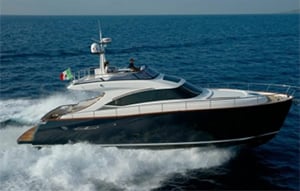You are thinking about selling or trading your marine pride and joy. But how do you know what it is truly worth? The adage about value based on “what the market will bear” naturally depends on the supply and demand for comparable boats and your urgency to buy or sell.
In any case, you should always have an approximate idea of your boat’s market value before you begin to deal. And, knowing how watercraft are valued can be a critical bit of knowledge for someone who looks for a replacement every few years.
Here are the key drivers that will determine the value of any boat.
 Age
Age
Boats, like cars, depreciate with time. Without the latest technologies and design efficiencies combined with the ravages of wear and tear, older boats gradually lose value. With earlier models, buyers may see the boat’s useful life as limited and envision substantial maintenance repair in the not-so-distant future.
Mechanical and Physical Condition
While age can be a limiting factor, the mechanical and physical condition can make a more significant difference. Many used and older boats are in beautifully maintained condition. In many instances, a 10-year-old watercraft in great shape is worth more than a 5-year-old option that has been poorly maintained. The boat’s value depends on the condition of the motor, as well as the interior and exterior.
If you are uncertain about the condition, a professional marine survey can pin down the overall health of your boat.
Make, Model, and Size
Some boat makers are known for their quality of work and the longevity of the life of their boats. Their production may have been more expensive when new, but the ability to withstand the rigors of use and harsh elements is legendary with some brands. Even with the more reputable manufacturers, some of their models within their full line have attained a more exceptional reputation for durability than their lower-cost offerings.
In general, the larger the boat, the more value, if for no other reason than these required more material to build. However, keep in mind that a somewhat smaller craft by a more reputable boat builder can retain a higher value than a bigger boat from a less respected manufacturer.
History
The history of a boat can reduce its desirability, even if it has been well restored. Buyers begin to look away as soon as they learn that your boat has been battered and damaged by storms, wrecked, or even sunk and renovated. Expect the craft’s value to depreciate as a result.
Accessories
The “bells and whistles” can help sustain the value of your boat only if they are fully functional and consist of relatively current technology. Such items as stabilizers, fancy electronics, sound systems, engine upgrades, and more can be attractive to prospective buyers.
Fix It Up
As with selling a car or a home, fixing or replacing those elements that are faulty or missing will help to establish the real fair value of your boat. Sometimes even minor upgrades can make a major difference. There are also other things that can help with your boats value. Make sure you get your boat ready to sell before you put her on the market.
Comparative Sales
The market is fluctuating all the time. To understand the current value of your boat, you can do what the realtors and brokers do by analyzing the prices paid recently for boats that are similar in type, size, condition, make, and accessories. Comparing against boats in your geographic region is most meaningful.
Contact an Experienced Yacht Broker
The professionals at Cape Yachts in South Dartmouth, MA depend on knowing current market conditions for their livelihood. If you are thinking about selling, let a Cape Yacht’s expert help you to understand the current value and marketability of your boat. We will perform a current marketing analysis of your boat and let you know what she's worth as outfitted today. We will also supply you with a complimentary "Recently Sold Boats" report for comparison.
Please contact us today, to learn more. We have been helping find the right boat for the right family since 1986.

